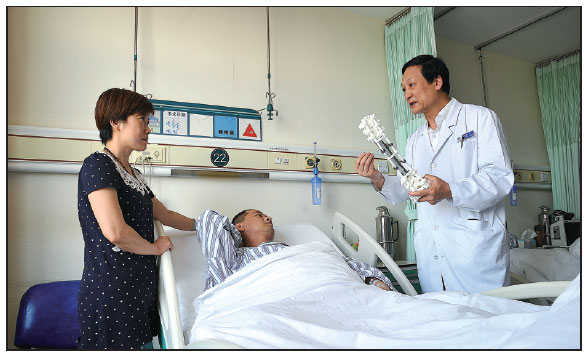3-D printer saves man stricken with cancer in spine from paralysis
By Liu Zhihua ( China Daily ) Updated: 2016-07-09 07:33:24
|
Liu Zhongjun (right), director of the orthopedics department of Peking University Third Hospital, started his research in medical application of 3D technology in 2009. |
Yuan's 3-D printed implant was customized to cope with the curvature of his spine, and doctors designed special joints to attach it firmly to the titanium rods, which made the two parts of the implant a strong whole that is firm and is very supportive of the spine.
The 3-D printed implant also has pores that allow bones on healthy vertebrae to grow into the artificial implant and eventually to fuse with it.
"3-D printing technology in orthopedics is promising, as it is in many other fields," Liu said.
After the surgery, Yuan was transferred to a normal inpatient ward rather than an intensive care unit because he lost less blood than would have been the case with traditional implant surgery. He is recovering much more quickly than expected, the doctors say.
In August 2014 the hospital treated a 12-year-old boy suffering from a rare tumor in the axis (the second cervical vertebra), with a replica vertebra generated by 3-D printing.
More than 60 patients have benefited from 3-D printed orthopedic implants in the hospital, Liu said.
Led by Liu, the hospital's orthopedics department started studying the medical application of artificial vertebral body products by 3D printing in 2009, in collaboration with a medical device company in Beijing that owns an imported 3-D printer.
The medical team provided designs based on their clinical experience and understanding of surgical needs supported by medical images, and the company digitalized the design through software the company developed for printing.
Animal trials on sheep started later, which proved the implants were safe, and clinical trials began in late 2012.
Last September, the China Food and Drug Administration approved the use of 3-D printed hips joint product developed by the team, and in May the administration approved the team's 3-D printed artificial vertebral body product.
The application of 3D printing technology in medical field cannot be realized without successful interdisciplinary studies, and that means innovation plays a very important role in the research, Liu Zhongjun, the orthopedist, says.
It is a good opportunity for Chinese scientists to work hard to make world-leading achievements in such medical applications, because to some extent, scientists worldwide are competing from the similar starting line, as medical application of 3-D printing is quite a new scientific field internationally, he adds.
In 2005, scientists in Europe invented 3D-printed metal acetabular cup, a component for hip replacement, and many Chinese hospitals have been researching in 3-D printed medical implants, according to him.
The application of 3-D printing in medical treatment can also reduce the treatment cost for patients, Liu says.
In China, about 66 to 80 percent of the cost in an orthopedic surgery is due to the cost of artificial implants, and most of the high quality artificial implants used in surgeries are imported ones or are patented by foreign companies, which are very expensive compared with Chinese companies'.
Through 3-D printing, the manufacturing of artificial implants will be more productive and less costly, and thus can reduce patients' surgery cost burden significantly, Liu says.
Even a conservative estimate suggests that 3-D printed artificial implants will be of only half cost of that made by traditional manufacturing method, Liu notes.
However, to have a competitive advantage in the medical application of 3-D printing technology compared with other countries, it is urgent for the Chinese health authorities to have an efficient and comprehensive evaluation procedure to approve the clinical use of such 3-D medical products, Liu says.
(China Daily 07/09/2016 page18)
- Physician Data Query introduced to China to help cancer treatment
- Very hot drinks 'possibly carcinogenic', says WHO's cancer agency
- Cancer risk from coffee downgraded 专家降低因喝咖啡而患癌症风险级别
- Australian experts weigh in on link between coffee, cancer
- Aussie cancer center discovers new treatment for acute myeloid leukaemia
|
|
|
|
|
|
|
|


























 Raymond Zhou:
Raymond Zhou: Pauline D Loh:
Pauline D Loh: Hot Pot
Hot Pot Eco China
Eco China China Dream
China Dream China Face
China Face






